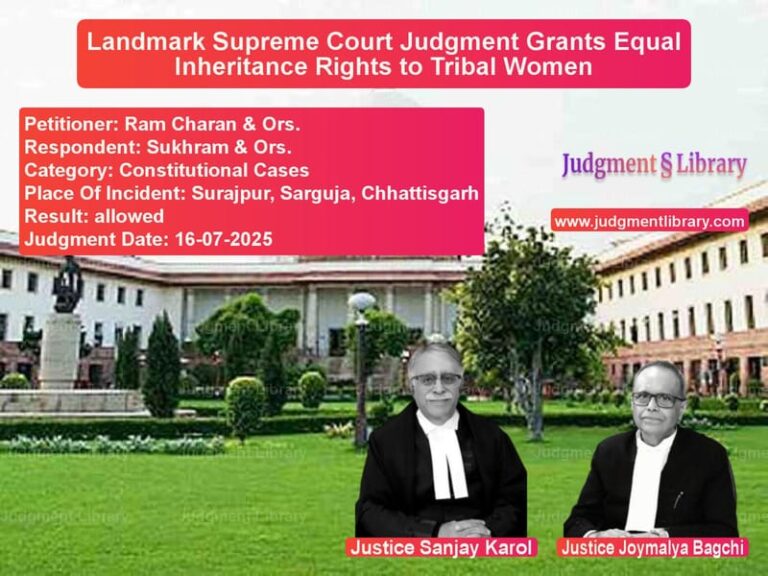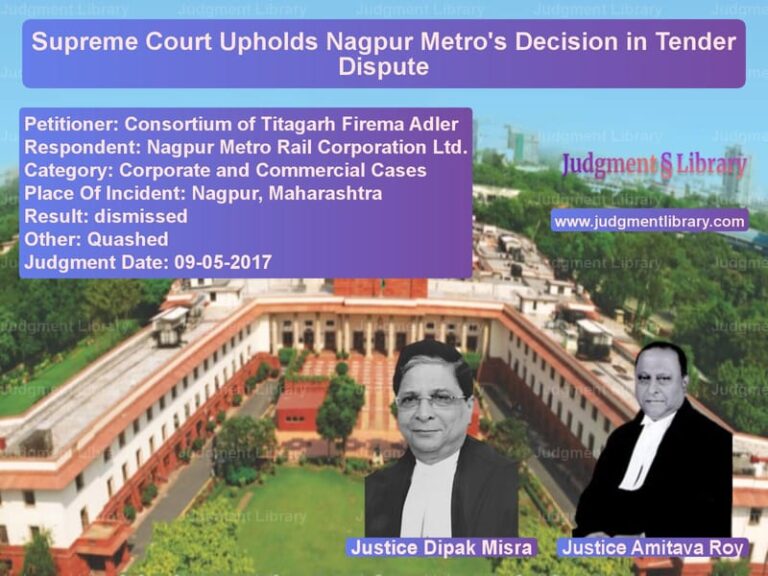Supreme Court Ruling on Automatic Vacation of Stay Orders: High Court Bar Association, Allahabad vs. State of U.P.
The Supreme Court of India recently delivered a crucial judgment in High Court Bar Association, Allahabad vs. State of U.P., addressing the automatic vacation of stay orders issued by High Courts. The case arose from concerns regarding the impact of the decision in Asian Resurfacing of Road Agency Private Limited & Anr. v. Central Bureau of Investigation, which had directed that all interim stay orders would automatically lapse after six months unless specifically extended by a speaking order.
The Supreme Court in this case examined the validity of such automatic vacation and ruled that interim orders of stay granted by High Courts cannot be set aside solely on the lapse of time. The Court emphasized that judicial orders must be vacated only through due process, ensuring fairness and adherence to principles of natural justice.
Background of the Case
The matter was brought before the Supreme Court when the High Court Bar Association, Allahabad, challenged the directions issued in Asian Resurfacing, arguing that they were contrary to established legal principles. The challenge questioned whether the Supreme Court, through its jurisdiction under Article 142 of the Constitution, could order the automatic vacation of interim stay orders.
The Court acknowledged the need for expeditious disposal of cases but emphasized that automatic vacation of stay orders without judicial review could result in serious miscarriage of justice.
Key Legal Issues Considered
- Can the Supreme Court order automatic vacation of all interim stay orders granted by High Courts?
- Does such automatic vacation violate principles of natural justice?
- What is the extent of High Court powers under Article 226 and 227 of the Constitution?
- Should courts set rigid time limits for case disposal?
Petitioner’s Arguments (High Court Bar Association, Allahabad)
- Automatic vacation of interim stay orders is judicial overreach and amounts to judicial legislation.
- Article 226 is part of the basic structure of the Constitution, and no court can curtail it through judicial orders.
- Interim relief orders are granted based on legal principles and should not be vacated arbitrarily.
- The decision in Asian Resurfacing imposed an unfair burden on litigants, as delays are often due to court schedules and not the litigants themselves.
Respondent’s Arguments (State of Uttar Pradesh)
- The State supported the need for speedy disposal of cases and argued that indefinite stay orders cause delays in criminal and civil trials.
- It defended the logic behind Asian Resurfacing, stating that courts must ensure that trial proceedings are not unduly stalled.
- However, the State acknowledged that automatic vacation of stay without judicial review may be problematic.
Supreme Court’s Analysis
The Supreme Court, in a detailed judgment, addressed the critical issues raised in the case. The judgment was authored by Justice Abhay S. Oka and supported by Chief Justice D.Y. Chandrachud, Justice J.B. Pardiwala, and Justice Manoj Misra. Justice Pankaj Mithal provided a concurring opinion.
The Court made the following key observations:
- Interim relief orders are granted after judicial application of mind and cannot be vacated automatically.
- The power of High Courts under Article 226 and 227 of the Constitution cannot be curtailed through a blanket order.
- The Asian Resurfacing ruling was well-intentioned but impractical, as court delays are often systemic and not due to litigants.
- Judicial discretion must be exercised on a case-by-case basis when deciding to extend or vacate stay orders.
Final Verdict
The Supreme Court ruled that automatic vacation of stay orders is unconstitutional and violates principles of natural justice. The key rulings were:
- Stay orders cannot automatically expire after six months.
- Each case must be examined individually to determine if the stay should continue.
- The High Courts must decide applications for vacating stay orders on priority.
- Courts should not impose rigid timelines for case disposal unless required under exceptional circumstances.
Conclusion
The judgment provides much-needed clarity on the issue of interim reliefs and judicial discretion. While emphasizing the need for speedy trials, the Supreme Court has reaffirmed that justice cannot be compromised by arbitrary procedural constraints. This ruling protects the rights of litigants and ensures that High Courts retain their constitutional autonomy in granting and reviewing interim reliefs.
Petitioner Name: High Court Bar Association, Allahabad.Respondent Name: State of Uttar Pradesh.Judgment By: Justice Dhananjaya Y. Chandrachud, Justice Abhay S. Oka, Justice J. B. Pardiwala, Justice Manoj Misra, Justice Pankaj Mithal.Place Of Incident: Allahabad High Court.Judgment Date: 29-02-2024.
Don’t miss out on the full details! Download the complete judgment in PDF format below and gain valuable insights instantly!
Download Judgment: high-court-bar-assoc-vs-state-of-uttar-prade-supreme-court-of-india-judgment-dated-29-02-2024.pdf
Directly Download Judgment: Directly download this Judgment
See all petitions in Bail and Anticipatory Bail
See all petitions in Fraud and Forgery
See all petitions in Money Laundering Cases
See all petitions in Judgment by Dhananjaya Y Chandrachud
See all petitions in Judgment by Abhay S. Oka
See all petitions in Judgment by J.B. Pardiwala
See all petitions in Judgment by Manoj Misra
See all petitions in Judgment by Pankaj Mithal
See all petitions in partially allowed
See all petitions in Modified
See all petitions in supreme court of India judgments February 2024
See all petitions in 2024 judgments
See all posts in Criminal Cases Category
See all allowed petitions in Criminal Cases Category
See all Dismissed petitions in Criminal Cases Category
See all partially allowed petitions in Criminal Cases Category







